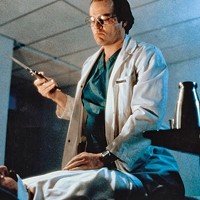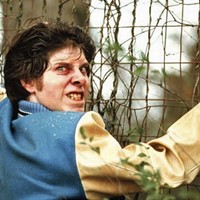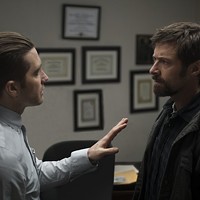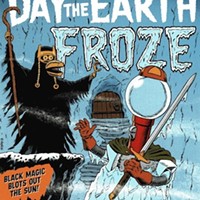(View From The Couch is a weekly column that reviews what's new on Blu-ray and DVD.)

-
Julia Louis-Dreyfus and James Gandolfini in Enough Said (Photo: Fox)
ENOUGH SAID (2013). Writer-director Nicole Holofcener has made only five features in her career, and I've been swept off my feet by all of them: 1996's Walking and Talking (Catherine Keener, Anne Heche), 2001's Lovely & Amazing (Keener, Brenda Blethyn), 2006's Friends with Money (Keener, Jennifer Aniston), 2010's Please Give (Keener, Rebecca Hall) and Enough Said, which trumps the lot. And yes, Keener's in this one as well, although she's not the lead: That would be Julia Louis-Dreyfus, playing the part of Eva. A masseuse by trade, Eva is dragged to a party by her best friend Sarah (Toni Collette). There, she meets Albert (James Gandolfini), and while sparks aren't immediately stricken, the two do seem comfortable with each other. Eva also meets Marianne (Keener), a poet who could use a good massage but who could use a good friend even more. Eva and Albert embark on the pivotal first date, and soon they're a couple, with Eva accepting the fact that this lovable bear of a man is (by his own definition) an overweight slob who's set in his ways. While dating Albert, she also spends time with Marianne, who mainly complains about her ex-husband. It turns out he was an overweight slob set in his ways, and ... well, you can probably guess where this leads. For Eva, it leads to a compromised relationship, as she tries to weigh Marianne's laundry list of gripes against the decent guy she sees before her. The plot ultimately is just a hanger on which to place Holofcener's typically engaging dialogue, a roomful of gracefully constructed characters, and a superlative turn by the late Gandolfini. Louis-Dreyfus and the supporting players are all excellent, yet it's Gandolfini who makes the biggest impression — and it goes beyond the poignant fact that this marks his penultimate screen appearance (he has one more work in the can, a crime flick written by Dennis Lehane and co-starring Tom Hardy and Noomi Rapace). Gandolfini was obviously best known for The Sopranos, yet I always took pleasure in the indelible supporting parts he tackled in such films as Get Shorty, The Mexican, Violet & Daisy and In the Loop. Here, he's given a rare lead role in a movie and nails the assignment, using his sensitive eyes and lumbering frame to convey the feelings of a man who's more vulnerable than anyone realizes.
Blu-ray extras include promotional featurettes; second takes; and the theatrical trailer.
Movie: ***1/2

-
John Abbott, Orson Welles and Joan Fontaine in Jane Eyre (Photo: Twilight Time)
JANE EYRE (1944). Over the past 100-plus years, there have been nearly two dozen film and TV versions of the Charlotte Bronte classic, with Samantha Morton, Mia Wasikowska and The Lone Ranger's Ruth Wilson among the Janes and Timothy Dalton, George C. Scott and Michael Fassbender among the Rochesters. The best version? If we're going with loose adaptations, that would be Jacques Tourneur's incredible 1943 chiller I Walked with a Zombie; if we're sticking with traditional interpretations, popular opinion easily sides with this atmospheric effort. Along with writer-director Robert Stevenson, no less than Aldous Huxley and John Houseman had a hand in the screenplay for this Gothic take that features many of its best scenes early. That would be the stretch when little Jane (Peggy Ann Garner) is sent by her cruel aunt (Agnes Moorehead) to a school for unwanted children, where she's tormented by the sadistic headmaster (Henry Daniell, adding to his lengthy list of screen villains) but strikes up a friendship with the kindly Helen Burns (an uncredited Elizabeth Taylor). Ten years later, Jane (now played by Joan Fontaine) leaves the school grounds and heads to the estate of Edward Rochester (Orson Welles), where she's to serve as governess to the French moppet Adèle (Margaret O'Brien). Rochester initially spends most of his time brooding and barking, but he and Jane eventually grow close, resulting in a bond that nevertheless might be broken thanks to his dark secret. Stevenson would go on to become Disney's most bankable director (Mary Poppins, The Love Bug, etc.), but don't expect any spoonfuls of sugar here: Jane Eyre is a dark, foreboding film, aided immeasurably by the efforts of director of photography George Barnes (Rebecca, Spellbound). The story isn't as tightly bound in the second half, resulting in an occasional lull; still, it's hard to ignore the hurricane force of Welles' performance.
Blu-ray extras include audio commentary by O'Brien (now 77) and Welles biographer Joseph McBride; separate audio commentary by film historians Julie Kirgo, Nick Redman and Steven C. Smith; an informative featurette that examines the careers of both Welles and Stevenson; 1944's Know Your Ally: Britain, a documentary short directed by Stevenson for the United States War Department; an isolated track featuring Bernard Herrmann's score; and the theatrical trailer.
Movie: ***
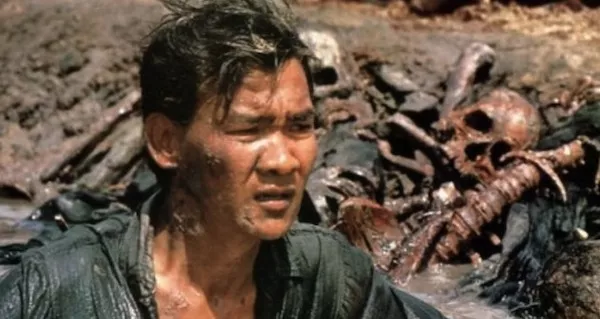
-
Dr. Haing S. Ngor in The Killing Fields (Photo: Warner Bros.)
THE KILLING FIELDS (1984). One of the great films from what proved to be a great year for cinema, The Killing Fields hasn't lost any of its power over the ensuing 30 years. Sam Waterston plays New York Times correspondent Sydney Schanberg, one of the foreign journalists assigned to Cambodia as the country contends with violent political upheaval during the 1970s. His assistant is a Cambodian named Dith Pran (Dr. Haing S. Ngor), and when the Khmer Rouge seize power, it's Pran who manages to save the international reporters from the Communist thugs. Unfortunately, while the foreigners are eventually allowed to leave the country, Pran is forced to remain behind, thereby becoming a prisoner of a regime that ended up murdering between two and three million citizens during its reign of terror. The Killing Fields is basically a two-part feature — the first half focusing on the journalists under fire, the second on Pran's great escape from his war-torn country — and it's a testament to the efforts of director Roland Joffé and scripter Bruce Robinson that both segments are equally superb. Chris Menges' camerawork is awe-inspiring, capturing both the atrocities of war and the beauty of nature, while Mike Oldfield's jangly score adds to the sense of unease. Waterston is fine as Schanberg — I like how his character is often an SOB rather than the traditional movie hero — while John Malkovich made a blazing entrance into motion pictures thanks to excellent work in both this (as photojournalist Al Rockoff) and the same year's Places in the Heart (for which he earned a Best Supporting Actor Oscar nomination). Yet the movie belongs to Ngor, who, like Pran, was a real-life survivor of Cambodia's killing fields and channeled all that emotion into his formidable performance. In a horrible twist of fate, Ngor had made it out of Cambodia only to be killed in America, shot by Chinatown gang members in 1996. Nominated for seven Academy Awards (including Best Picture and Best Actor for Waterston), this won for Best Supporting Actor (Ngor), Cinematography and Film Editing.
Blu-ray extras consist of audio commentary by Joffé and the theatrical trailer.
Movie: ****

-
Robin Williams and Forest Whitaker in Lee Daniels' The Butler (Photo: Anchor Bay & The Weinstein Company)
LEE DANIELS' THE BUTLER (2013). It's hard not to chortle during 1965's The Greatest Story Ever Told when Christ (Max von Sydow) is hanging on the cross and up lumbers John Wayne as a Roman centurion, drawling, "Truly, this man was the son of God," with the same cadence as if he were back in a Western saloon calling out a desperado. But stunt casting didn't begin with the sight of The Duke at the crucifixion, and it won't end with the roster of all-stars playing U.S. presidents in Lee Daniels' The Butler. Modifying a true-life tale, this centers on Cecil Gaines (Forest Whitaker), whose civility, grace and common sense allow him to land a gig at the White House, where he impresses the various power players who over the years grace the Oval Office. Cecil's a workaholic, which doesn't always bode well for his wife Gloria (Oprah Winfrey); more domestic turmoil takes place when their son Louis (David Oyelowo), coming of age in the midst of the Civil Rights movement, looks down on what he perceives to be his father's subservience to the white man and sprints in the opposite direction by attending marches and meetings. The Butler is at its best in those moments when it's addressing how the different approaches of two men to racial inequality — one working from within, one from without — can be equally valid courses of action and might even complement each other. The rest of the time, the film is entertaining but awfully slender — a light look at heavy history. The Forrest Gump approach of hopscotching through history gets trotted out: Louis chats with Martin Luther King, attends a Malcolm X rally, participates in a lunch counter sit-in, joins the Freedom Riders for a dangerous drive through the South and hangs out with the Black Panthers; in short, he does everything except refuse to move to the back of the bus alongside Rosa Parks. Cecil gets to play Gump by appearing in scenes with Kennedy, Nixon and others — only instead of being expertly injected into archival footage of the historical figures, Whitaker acts opposite movie stars cast as our commanders in chief. James Marsden plays JFK close enough to the vest that he's a harmless choice, and Liev Schreiber at least makes us laugh with his bulldog impersonation of LBJ. But it's a cheap, disposable parlor trick — a prez dispenser, as it were — casting Robin Williams as Eisenhower, John Cusack as Nixon and Alan Rickman as Reagan. Hiring unknowns would have been a more sound decision; instead, this miscasting only rekindles those flickering images of John Wayne standing up there on Golgotha, decked out in Roman garb but clearly longing for that place where the deer and the antelope play.
Blu-ray extras include a behind-the-scenes featurette; deleted scenes; and a look at the original Freedom Riders.
Movie: **1/2
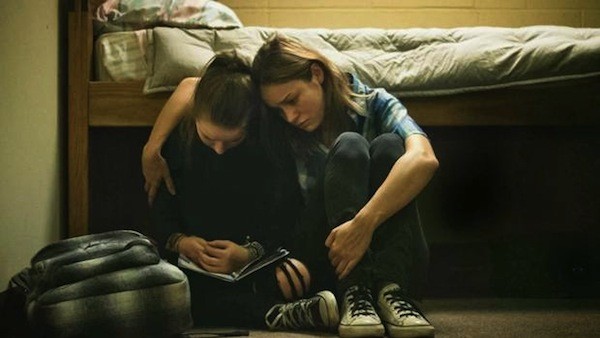
-
Kaitlyn Dever and Brie Larson in Short Term 12 (Photo: Cinedigm)
SHORT TERM 12 (2013). Short Term 12 offers the most concrete proof yet that Brie Larson will be with us long-term. A former child actress who's lately been filling out small but memorable parts in such features as 21 Jump Street, The Spectacular Now and Don Jon (stealing, if not whole scenes, at least steady glances in a near-wordless role as Joseph Gordon-Levitt's sister), the 24-year-old talent here does a wonderful job playing the leading character of Grace, one of the staffers at a facility for at-risk kids. Like her boyfriend and fellow worker Mason (John Gallagher Jr.), Grace has dealt with the burden of once being a troubled foster teen herself; hence, she's well-equipped to handle these kids who largely come from homes where they've been physically beaten and/or sexually abused, be it by foster parents, stepparents or even biological parents. Grace cares about all the youth in her care, including a sullen teen named Marcus (Keith Stanfield), yet she takes a particular interest in new arrival Jayden (Kaitlyn Dever), whose sexual abuse at the hands of her father has left the girl angry, isolated and prone to emotional meltdowns. Writer-director Destin Cretton doesn't shy away from showing the results of the brutalities life has hurled at these poor children: Not only does he keep the camera uncomfortably close to Jayden as she kicks and spits and swears at the Short Term 12 workers who seek to help her, he also forces us (in a different scene) to be as confused as Grace in trying to determine who's leaking the blood that's streaking a bedroom door. Cretton joins these scenes of horror with scenes of heartbreak — particularly a superbly scripted bit in which Grace listens silently to Jayden's metaphorical tale about the friendship between an octopus and a shark — but above all, he offers plenty of scenes of hope, illustrating how these people, the at-risk kids and the young supervisors who understand their pain, function best when they can turn to each other for the love and support that's been denied them their entire lives.
Blu-ray extras include a behind-the-scenes featurette; deleted scenes; a piece on the music; and the original Short Term 12, a short film made by Cretton in 2008 (and also co-starring Stanfield).
Movie: ***1/2
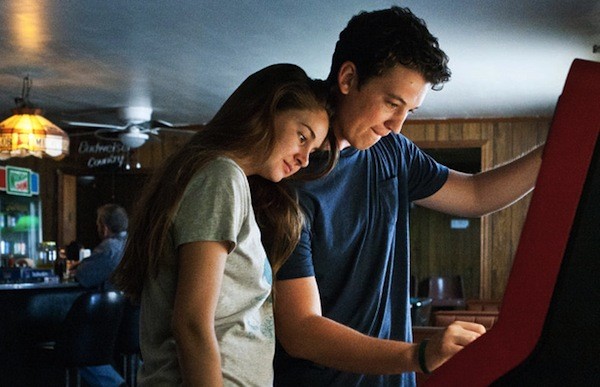
-
Shailene Woodley and Miles Teller in The Spectacular Now (Photo: Lionsgate)
THE SPECTACULAR NOW (2013). There's a spectacular performance hovering around the edges of The Spectacular Now, and it belongs to Shailene Woodley. Woodley, who played George Clooney's older daughter in The Descendants, here delivers the sort of transcendent turn that feels so natural, so precise, so perfect in every detail. She's not the central character, and in many ways, that's a shame. That's not meant to knock Miles Teller, who's rock-solid in the pivotal part of Sutter Keely. Sutter is the cool kid, the wisecracking high school senior with the hot girlfriend (Brie Larson), a laid-back job (at a men's clothing store) and an easygoing demeanor that allows him to talk to anyone anywhere. But Sutter also has problems: He has no desire to attend college, he unfairly blames his mom (Jennifer Jason Leigh) for his dad's departure, and the aforementioned girlfriend dumps him when it's clear they have no future together. But that's OK, as long as he has his trusty flask, his keg parties and his booze-fortified sodas. And it's after one of his drunken all-night revelries that he meets and befriends Aimee Finecky (Woodley), who's as shy and awkward as Sutter is garrulous and outgoing. Director James Ponsoldt and (500) Days of Summer scribes Scott Neustadter and Michael H. Weber (adapting Tim Tharp's novel) capture the insecurities and ill-advised decisions frequently made by teenagers, and they never allow any of the kids or adults to descend into caricature. But a late-inning incident — the movie's only melodramatic misstep — leads to a curiously rushed final act, one which shortchanges the characters, skips key developments and leaves an unsettling and unsatisfying feeling regarding what transpired. Even the hanging chad of an ambiguous final shot worked better in the service of other 2013 efforts that struck a similar pose right before the credits rolled (The Hunt, Trance, etc.). Among the many strengths, the most impressive is the subtle way the film builds upon Sutter's drinking, slowly revealing him not as a fun-loving kid but as a damaged individual just a few years away from becoming an alcoholic. It's not the sort of narrative spin found in high school flicks, and it's all the more powerful for not being preachy or sentimental. I approached The Spectacular Now expecting to see a movie like Sixteen Candles and was stunned when I got a prequel to Days of Wine and Roses instead.
Blu-ray extras include audio commentary by Ponsoldt; a four-part making-of featurette; and deleted scenes.
Movie: ***

